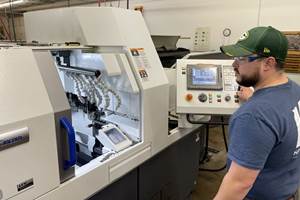Less Paper, More Information
Getting rid of the thousands of paper tapes was this shop's first objective--an objective that would best be accomplished through some sort of distributed numerical control (DNC) system. The system they selected took them from 'punched' to 'paperless.'
Share









Hwacheon Machinery America, Inc.
Featured Content
View More
Autodesk, Inc.
Featured Content
View MoreAt the close of 1996, Cooper Tools (Lexington, South Carolina) was just beginning to embrace a strategy that would change the way its manufacturing facilities operated. Dubbed “Lean Manufacturing” because of its focus on reducing costs, this new strategy aimed to increase throughput by removing non-value added activity from the company’s manufacturing operations.
In the early days of NC technology, part programs were compiled on a separate computer and their contents then coded or “punched” onto rolls of paper tape that the machine tool could read. Whenever an operator wanted to run a certain program, he or she had to retrieve the corresponding tape from the library, physically walk it over to the machine and then feed it in by hand. Cooper Tools still used this system.
Aaron Hildebrand, manager, Lean Manufacturing, was given the task of coming up with a solution. One problem was the setup time required for each and every operation. Cooper Tools frequently turns out low-volume runs of very complex components—some of which may require dozens of individual machine operations to complete. Also, the tapes can only contain the bare code needed to drive the machine through a certain operation. Peripheral materials such as process drawings, finished part drawings and tooling information—items the machinist needs to complete the job—have to be stored and collected separately.
The paper tape system also presented a storage/cataloguing dilemma. According to Mr. Hildebrand, the company had approximately 25,000 program tapes in use. These tapes, each of them representing a vital operation, had to be stored and continually monitored for accuracy. As operations were changed or updated, old tapes had to be removed and new tapes created in their place. The tapes were also vulnerable to damage and deterioration.
Getting rid of the thousands of paper tapes was Cooper Tools’ first objective—an objective that would best be accomplished through some sort of distributed numerical control (DNC) system. DNC technology allows all of the machines in a given facility to be connected directly to a single network. NC programs in a DNC system reside on a file server that any machine on the network can access. Thus, whenever an operator wants to run a certain program, it can be instantly downloaded from a server.
During the course of its evaluation, Cooper Tools considered at least half a dozen similar DNC systems. None of these “paperless” solutions had the potential to make Cooper’s shop floor truly paperless, however. They did nothing to automate the distribution of peripheral production information like drawings and setup instructions. The inability to distribute production information over the same network connection as the NC programs was seen as a major drawback, because the lack of timely production information added to the setup times.
Cooper Tools eventually found the solution it was looking for in a manufacturing software package called JobPack, published by DLoG (Hoffman Estates, Illinois). Along with providing solid DNC functionality, the software also has the ability to deliver production information such as blueprints and drawings directly to a computer screen.
An important aspect of making the shift from tape to DNC work within Cooper’s environment was to make it as simple as possible to use. So the interface uses large buttons and icon-driven menus. The shopfloor network could also be integrated with Cooper’s existing business management system, SAP. Though the company ultimately decided to hold off on a full integration (which would have merged the JobPack database with main business functions like ordering and accounting), it did link the two in such a way that operators on the floor could launch and use SAP directly from the JobPack environment—a function that simplified things from the operators’ perspective and got them used to dealing with one standard interface.
The initial pilot application took place at the Lexington, South Carolina, location. According to Mr. Hildebrand, the first step was gathering and then converting the approximately 25,000 paper tapes that were in circulation at the time. DLoG was able to help speed the process along.
Taking advantage of the ability to distribute production information electronically took somewhat longer because most of Cooper’s drawings and blueprints were not already in an electronic format (such as CAD) that the shopfloor information system could use.
“Only about 20 percent of the drawings were ready to export and use right away,” Mr. Hildebrand says. “The rest we had to scan in manually.”
The most direct benefit of the new system was a measurable reduction in setup time. According to Mr. Hildebrand, the system more than paid for itself on that basis alone. Prior to its installation, Cooper Tools’ machinists averaged 17 minutes of setup time per operation, related to loading NC programs into their machine tools. When the DNC and information system came online, that figure dropped to one minute. Duplicated over thousands of setups, the fiscal impact of this 16-minute difference was substantial.
Following the installation at Cooper Tools’ Lexington facility, the system was also installed at the company’s Dayton, Ohio, facility. Plans are underway to implement the software at three of Cooper’s other domestic plants, as well as one facility in Germany.
The benefits of having JobPack standardized across these facilities will be significant. Standardization will allow them to download one another’s programs and production materials instantly, through a standard client/server connection. According to Mr. Hildebrand, this ability allows workloads to be more easily distributed when demand in one market segment falls, while demand in another rises. JobPack allows work orders to be easily passed on to other plants with idle capacity. In fact, this flexibility was a key part of Cooper’s initial decision to implement the software across the division.
“One of our main concerns when shopping around for a new system was scalability. We wanted to be sure that any system we installed would be able to accommodate our entire operation, both now and in the future,” says Mr. Hildebrand. MMS
Related Content
Tips for Designing CNC Programs That Help Operators
The way a G-code program is formatted directly affects the productivity of the CNC people who use them. Design CNC programs that make CNC setup people and operators’ jobs easier.
Read More4 Commonly Misapplied CNC Features
Misapplication of these important CNC features will result in wasted time, wasted or duplicated effort and/or wasted material.
Read MoreHow this Job Shop Grew Capacity Without Expanding Footprint
This shop relies on digital solutions to grow their manufacturing business. With this approach, W.A. Pfeiffer has achieved seamless end-to-end connectivity, shorter lead times and increased throughput.
Read MoreERP Provides Smooth Pathway to Data Security
With the CMMC data security standards looming, machine shops serving the defense industry can turn to ERP to keep business moving.
Read MoreRead Next
5 Rules of Thumb for Buying CNC Machine Tools
Use these tips to carefully plan your machine tool purchases and to avoid regretting your decision later.
Read MoreRegistration Now Open for the Precision Machining Technology Show (PMTS) 2025
The precision machining industry’s premier event returns to Cleveland, OH, April 1-3.
Read MoreBuilding Out a Foundation for Student Machinists
Autodesk and Haas have teamed up to produce an introductory course for students that covers the basics of CAD, CAM and CNC while providing them with a portfolio part.
Read More































.jpg;maxWidth=300;quality=90)




.jpg;maxWidth=300;quality=90)









